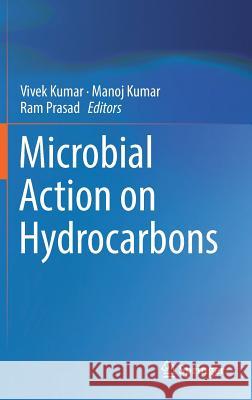Microbial Action on Hydrocarbons » książka



Microbial Action on Hydrocarbons
ISBN-13: 9789811318399 / Angielski / Twarda / 2019 / 667 str.
Microbial Action on Hydrocarbons
ISBN-13: 9789811318399 / Angielski / Twarda / 2019 / 667 str.
(netto: 1073,48 VAT: 5%)
Najniższa cena z 30 dni: 1079,53
ok. 16-18 dni roboczych.
Darmowa dostawa!
The book discusses ways to overcome the side effects of using hydrocarbon-based products as energy sources. Hydrocarbons produce raw crude oil waste of around 600,000 metric tons per annum, with a range of uncertainty of 200,000 metric tons per year.
I. Bioremediation- a step ahead
1. 1. Mechanism of hydrocarbon bioremediation
2. 2. Bioremediation of lubricant oil contaminated soils using enhanced land farming system3. 3. Metagenomic analysis of the bioremediation of diesel contaminated soils
4. 4. Study on the bioremediation of diesel oil contaminated soil from a gas station
5. 5. Plant-microbe association for bioremediation of hydrocarbon substrates
6. 6. Bioremediation of oil contaminated soil with composting
7. 7. Bioremediation of oil contaminated soil: Effect of non-ionic surfactants and selected bacterial strains
8. 8. Small scale in-situ bioremediation of diesel contaminated soil
9. 9. Bioremediation of petroleum hydrocarbons in contaminated soil with the earthworm
10. 10. Ex situ bioremediation of a tropical soil contaminated with petroleum products
11. 11. Bioremediation of hexadecane enhanced by photosynthetically produced marine biosurfactants
II. Microbes in bioremediation
12. 12. Microbial bioremediation of petroleum hydrocarbon: An overview
13. 13. Role of filamentous fungi to remove petroleum hydrocarbons from environment
14. 14. Petroleum microbiology under extreme environments
15. 15. Microbes and petroleum bioremediation
16. 16. Bioremediation of hydrocarbon contaminated soil by microbes immobilized in polyvinyl alcohol
17. 17. Bioremediation of diesel fuel contaminated soil by novel microbes
18. 18. Bioremediation of diesel-contaminated soils by natural occurring microbes
19.
III. Degradation assessment
20. 19. Hydrocarbon degradation assessment: Biotechnical approaches involved
Dr. Vivek Kumar is an Associate Professor at the Himalayan School of Biosciences, Swami Rama Himalayan University, Jolly Grant, Dehradun, India and is leading the Plant-Microbe-Interaction and Microbial Ecology research group. He obtained his masters and doctoral degrees from CCS Haryana Agricultural University, Hisar, Haryana, India. He is an editor and reviewer of several respected international journals. He has published over a hundred research papers, book chapters and review articles. He has also authored one practical manual and edited several books with Springer Nature. Dr. Kumar also served as a microbiologist for eight years at the Department of Soil and Water Research, Public Authority of Agricultural Affairs & Fish Resources, Kuwait. He has been credited with the first reporting and identification of Pink Rot inflorescence disease of the date palm in Kuwait caused by Serratia marcescens. He has also organized a number of conferences/workshops as convener/ organizing secretary.
Dr. Kumar’s research areas include environmental microbiology, plant-microbe-interactions, and bioremediation. In 2002 he was awarded ‘Young Scientist Award’ in ‘Agricultural Microbiology’ by the Association of Microbiologists of India (AMI).
Dr. Manoj Kumar is currently working as an Associate Professor at the Centre for Life Sciences, Central University of Jharkhand, Ranchi, India and is leading the Plant Developmental Biology research group. Hepursued his PhD in Plant Biotechnology at the prestigious Jawaharlal Nehru University and was then awarded two consecutive postdoctoral fellowships: i) DBT-PDF from IISc Bangalore in 2005 and then NRF-PDF from University of Pretoria. His research interests focus on plant biotechnology and he is affiliated with Ton Duc Thang University, Vietnam. Until recently, he was a coordinator of the Bio-resource Chapter (Northern India) and served on the editorial boards of five international journals.
Dr. Kumar has published several research papers, books and review articles. He has also guided several research projects and collaborated internationally.
Dr. Ram Prasad is an Assistant Professor at the Amity Institute of Microbial Technology, Amity University, Uttar Pradesh, India. His research interests include plant-microbe interactions, sustainable agriculture and microbial nanobiotechnology. Dr. Prasad has published more than a hundred research papers, and reviews & book chapters and has five patents issued or pending, and edited or authored several books. Dr. Prasad has twelve years of teaching experience and was awarded the Young Scientist Award (2007) and Prof. J.S. Datta Munshi Gold Medal (2009) by the International Society for Ecological Communications; FSAB fellowship (2010) by the Society for Applied Biotechnology; Outstanding Scientist Award (2015) in the field of Microbiology by Venus International Foundation; BRICPL Science Investigator Award (2017); Award for Excellence in Research from 6th Academic Brilliance Awards-2018 and the American Cancer Society UICC International Fellowship for Beginning Investigators (USA, 2014). In 2014-2015, Dr. Prasad served as a Visiting Assistant Professor at the Department of Mechanical Engineering at Johns Hopkins University, USA and since 2017 has served as a Research Associate Professor at the School of Environmental Science and Engineering, Sun Yat-Sen University, China.
The book discusses ways to overcome the side effects of using hydrocarbon-based products as energy sources. Hydrocarbons produce raw crude oil waste of around 600,000 metric tons per annum, with a range of uncertainty of 200,000 metric tons per year. The various chapters in this book focus on approaches to reduce these wastes through the application of potential microbes, in a process called bioremediation. The book is a one-stop reference resource on the methods, mechanisms and application of the bio-composites, in the laboratory and field. Focusing on resolving a very pressing environmental issue, it not only provides details of existing challenges, but also offers deeper insights into the possibility of solving problems using hydrocarbon bioremediation.
1997-2026 DolnySlask.com Agencja Internetowa
KrainaKsiazek.PL - Księgarnia Internetowa









